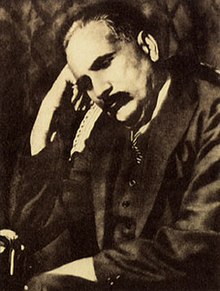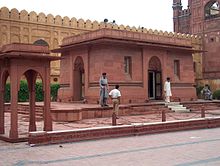History Of The Poet Muhammad Allama Iqbal
Muhammad Iqbal
Sir Muhammad Iqbal (Urdu: محمد اقبال ) (November 9, 1877 – April 21, 1938), widely known as Allama Iqbal (علامہ اقبال), was a poet, philosopher, and politician, as well as an academic, barrister and scholar[1][2] in British India who is widely regarded as having inspired the Pakistan Movement. He is called the "Spiritual father of Pakistan".[3] He is considered one of the most important figures in Urdu literature,[4] with literary work in both the Urdu and Persian languages.[2][4]Iqbal is admired as a prominent poet by Pakistanis, Indians, Iranians, Bangladeshis, Sri Lankans and other international scholars of literature.[5][6][7] Though Iqbal is best known as an eminent poet, he is also a highly acclaimed "Muslim philosophical thinker of modern times".[2][7] His first poetry book, Asrar-e-Khudi, appeared in the Persian language in 1915, and other books of poetry include Rumuz-i-Bekhudi, Payam-i-Mashriq and Zabur-i-Ajam. Amongst these, his best known Urdu works are Bang-i-Dara, Bal-i-Jibril, Zarb-i Kalim and a part of Armughan-e-Hijaz.[8] Along with his Urdu and Persian poetry, his Urdu and English lectures and letters have been very influential in cultural, social, religious and political disputes.[8]
In 1922, he was knighted by King George V,[9] granting him the title "Sir".[10] While studying law and philosophy in England, Iqbal became a member of the London branch of the All-India Muslim League.[7][8] Later, during the League's December 1930 session, he delivered his most famous presidential speech known as the Allahabad Address in which he pushed for the creation of a Muslim state in Northwest India.[7][8]
In much of South Asia and the Urdu speaking world, Iqbal is regarded as the Shair-e-Mashriq (Urdu: شاعر مشرق, "Poet of the East").[11][12][13] He is also called Mufakkir-e-Pakistan (Urdu: مفکر پاکستان, "The Thinker of Pakistan"), Musawar-e-Pakistan (Urdu: مصور پاکستان, "Artist of Pakistan") and Hakeem-ul-Ummat (Urdu: حکیم الامت, "The Sage of the Ummah"). The Pakistan government officially named him a "national poet".[7] His birthday Yōm-e Welādat-e Muḥammad Iqbāl (Urdu: یوم ولادت محمد اقبال), or Iqbal Day, is a public holiday in Pakistan.[14] In India he is also remembered as the author of the popular song Saare Jahaan Se Achcha.[15]
Dr. Sir Allama
Muhammad Iqbal
محمد اقبال

Higher education in Europe
Iqbal was influenced by the teachings of Sir Thomas Arnold, his philosophy teacher at Government college Lahore. Arnold's teachings determined Iqbal to pursue higher education in the West, and in 1905, he travelled to England for that purpose. Iqbal qualified for a scholarship from Trinity College, University of Cambridge and obtained Bachelor of Arts in 1906, and in the same year he was called to the bar as a barrister from Lincoln's Inn. In 1907, Iqbal moved to Germany to pursue his doctoral studies, and earned a Doctor of Philosophy degree from the Ludwig Maximilian University of Munich in 1908. Working under the guidance of Friedrich Hommel, Iqbal's doctoral thesis entitled The Development of Metaphysics in Persia was published.[12][24][25][26]During Iqbal's stay in Heidelberg in 1907 his German teacher Emma Wegenast taught him about Goethe's Faust, Heine and Nietzsche.[27] During his study in Europe, Iqbal began to write poetry in Persian. He prioritised it because he believed he had found an easy way to express his thoughts. He would write continuously in Persian throughout his life.[12]
Final years and death
The tomb of Muhammad Iqbal at the entrance of the Badshahi Mosque in Lahore
Iqbal as a Barrister-at-Law
A night view of the tomb
The government and public organisations have sponsored the establishment of educational institutions, colleges and schools dedicated to Iqbal, and have established the Iqbal Academy Pakistan to research, teach and preserve his works, literature and philosophy. Allama Iqbal Stamps Society was established for the promotion of Iqbaliyat in philately and in other hobbies. His son Javid Iqbal has served as a justice on the Supreme Court of Pakistan. Javaid Manzil was Iqbal's last residence.[32]
Further information: Pakistan Movement
While dividing his time between law practice and poetry, Iqbal had
remained active in the Muslim League. He did not support Indian
involvement in World War I and remained in close touch with Muslim political leaders such as Mohammad Ali Jouhar and Muhammad Ali Jinnah. He was a critic of the mainstream Indian National Congress, which he regarded as dominated by Hindus,
and was disappointed with the League when during the 1920s, it was
absorbed in factional divides between the pro-British group led by Sir Muhammad Shafi and the centrist group led by Jinnah.[33][unreliable source?]
Iqbal with Muslim politicians.
(L to R): M. Iqbal (third), Syed Zafarul Hasan (sixth) at Aligarh Muslim University
(L to R): M. Iqbal (third), Syed Zafarul Hasan (sixth) at Aligarh Muslim University






Comments
Post a Comment